Camponotus (Tanaemyrmex) pompeius Forel
  Type location Gabon
(Camponotus rubripes Drury r. C, Pompeius n. stirps, Forel,
1886f: 157, major & minor workers; Emery, 1899e: 501, queen;
Menozzi, 1933a: 110, male) collected by Büttner Type location Gabon
(Camponotus rubripes Drury r. C, Pompeius n. stirps, Forel,
1886f: 157, major & minor workers; Emery, 1899e: 501, queen;
Menozzi, 1933a: 110, male) collected by Büttner
subspecies
cassius (Camponotus
(Dinomyrmex) pompeius Forel subspecies cassius new subspecies, Wheeler,
1922: 239, illustrated, major & minor workers) Zaïre - no
images on Antweb (October 2014)
iota (Camponotus
(Tanaemyrmex) pompeius For. v. iota
n. var., Santschi, 1926b: 257, minor worker) Congo, Boda, P
Charleuf - see http://www.antweb.org/specimenImages.do?code=casent0912015
marius (Camponotus
Pompeius subsp. Marius
n. subsp., Emery, 1899e: 502, illustrated, minor worker) Cameroun,
collected by Conradt and Sjöstedt - see bottom
all forms known (see Bolton, 1995)  . .
NOTE: The types
of this and C. wellmani are
identical, the latter, therefore is the junior synonym!!
|
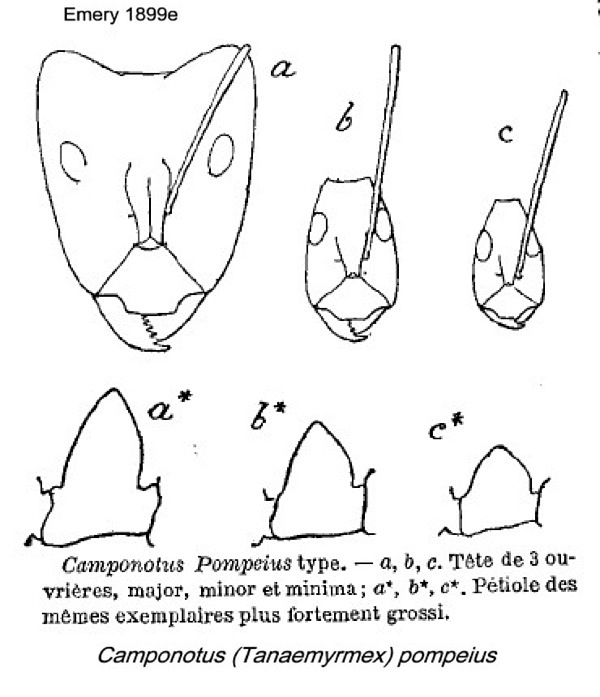 Forel's
(1886f) description is at Forel's
(1886f) description is at  with a further description by Emery
(1899e) at with a further description by Emery
(1899e) at  , with an illustrated
description of marius by Emery (1899e) at , with an illustrated
description of marius by Emery (1899e) at  , and notes on varieties
by Santschi (1926b) at , and notes on varieties
by Santschi (1926b) at  . Menozzi's (1933a)
description of the male is at . Menozzi's (1933a)
description of the male is at  . .
Wheeler (1922) listed records from Togo (at
Bismarckburg, by Conradt), Cameroun (Duala by von Rothkirch,
Campo Mountains by Schultze, Molundu and Yukaduma by Schultze); and
various Congo areas.
|
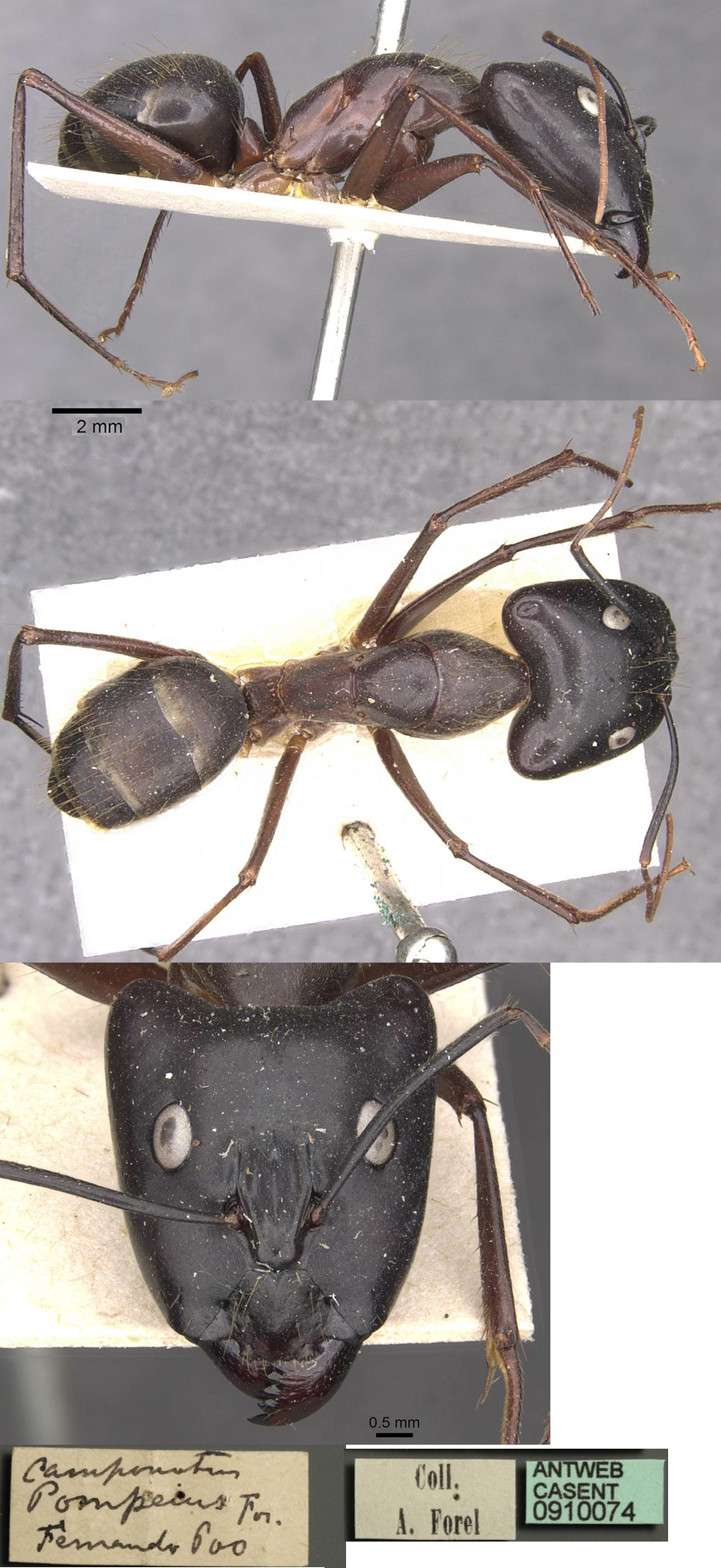 The
photomontage is of the type major worker collated
from http://www.antweb.org/specimen.do?name=casent0910074 The
photomontage is of the type major worker collated
from http://www.antweb.org/specimen.do?name=casent0910074
|
 The
photomontage is of the type minor worker collated
from http://www.antweb.org/specimen.do?name=casent0910075 The
photomontage is of the type minor worker collated
from http://www.antweb.org/specimen.do?name=casent0910075
|
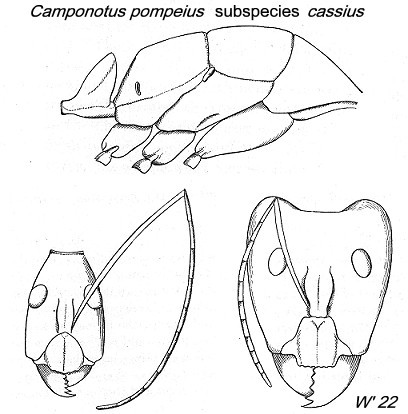 Subspecies cassius Subspecies cassius
Wheeler (1922) described cassius as a new
subspecies and provided the illustration (left),
WORKER MAXIMA - Differing from the maxima of the typical pompeius
in having the head distinctly smoother, more shining, and more
superficially shagreened, the apical tooth of the mandibles much
longer, the corners of the clypeal lobe much more acute, the superior
border of the petiole somewhat more obtuse, the petiole and thorax
brownish red, except the pronotum and dorsum of the mesonotum, which
are dark brown. The thorax and coxae are covered with much longer,
denser, and more conspicuous yellowish pubescence than in typical pompeius.
WORKER MINIMA - Very similar to the typical form but the thorax and
legs paler, and the head and thorax with longer pubescence.
Described from a single maxima and seven minimae from Yakuluku, Zaïre
(Lang and Chapin). Four males from Medje and Faradje and three females
from Stanleyville are probably referable to this or to one of the other
forms of pompeius. They have the propodeum and legs more
reddish than in the typical form. The wings of both females and males
are slightly yellowish, with resin-colored veins and dark brown
pterostigma.
|
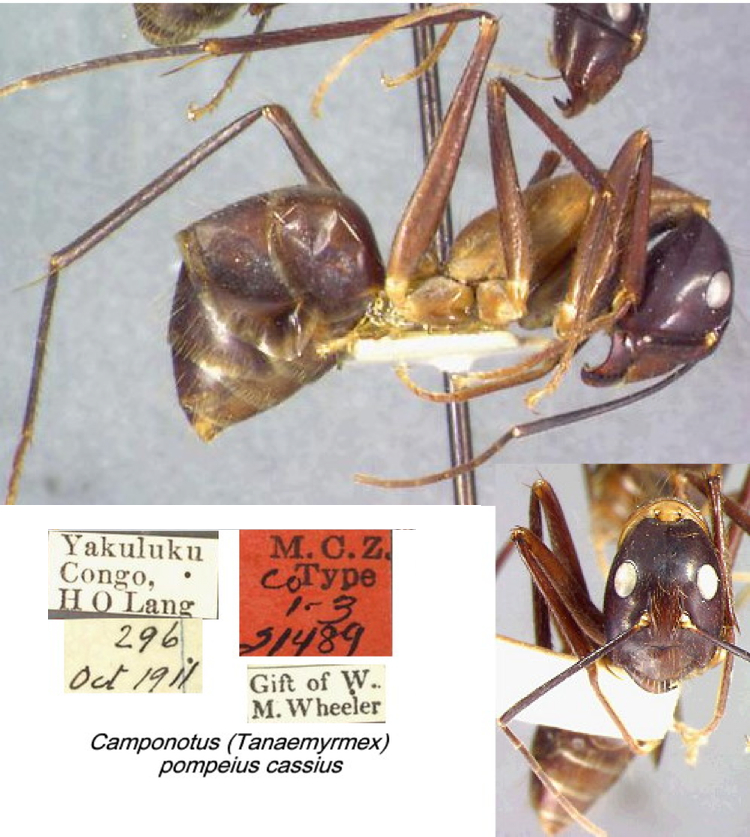 The photomontage is
of a cotype of Camponotus pompeius
cassius from Zaïre. The original photographs, together
with enlarged images, are from the MCZ, Harvard University, website at
- MCZ link. The photomontage is
of a cotype of Camponotus pompeius
cassius from Zaïre. The original photographs, together
with enlarged images, are from the MCZ, Harvard University, website at
- MCZ link.
Wheeler noted of the subspecies marius Emery -
Specimens from Medje, Akenge and Niapu (Lang and Chapin). Two maxima
and twenty-nine minima workers all from the stomachs of toads (Bufo
polycercus, funereus, and superciliaris) and one
small worker from Niapu from the stomach of a frog (Xenopus
tropicalis) seem to belong to this form. Though from different
localities, the two maximae both have the head much smaller and
narrower (without the mandibles, 4.5 X 3.9 mm) than in the typical pompeius
or the preceding subspecies and agree very closely with Emery's
description. He believed that the specimen he examined was not a
maxima, but the two specimens from Medje and Akenge seem to indicate
that the small narrow head may be characteristic of the largest worker
of the subspecies. The petiolar scale in my specimens is also high and
pointed, precisely as in Emery's figure, the scapes are long (4.5 mm.),
and the coloration and sculpture agree with his description.
Bernard (1952) reported (a large species) 5 workers and
an enormous queen from Guinea, Mt. Nimba survey at Mount Tô,
1600 m.
Recorded as Camponotus probably marius Emery,
from Ghana; collected from open ground at the Mampong Cemetery
Farm by Room (1971).
|
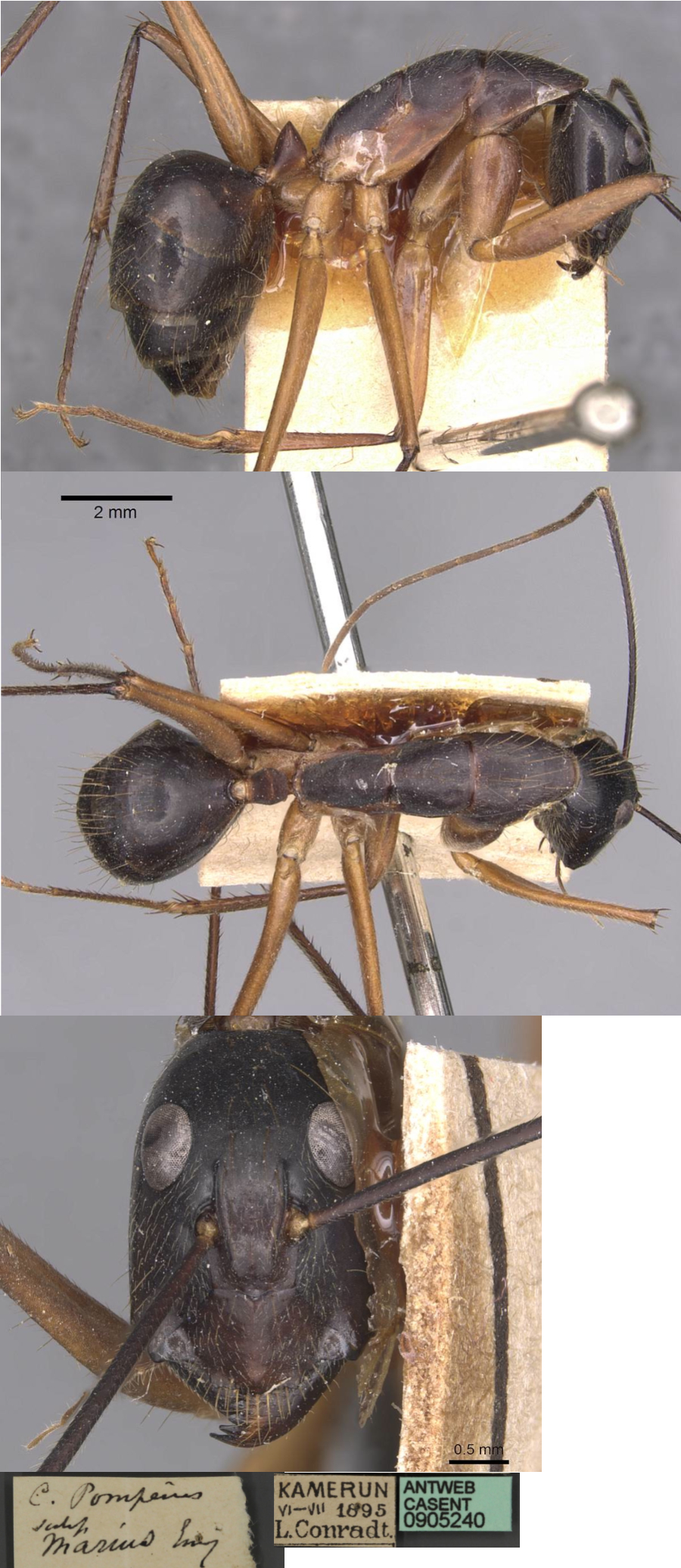 The photomontage of
the type
minor worker of marius is
collated from http://www.antweb.org/specimen.do?name=casent0905240. The photomontage of
the type
minor worker of marius is
collated from http://www.antweb.org/specimen.do?name=casent0905240.
|
Oxford University Museum
specimens
Camponotus (Tanaemyrmex) pompeius
B Taylor det.
|
Central African
Republic
P Annoyer
KG
|
12-18.x.2008
Dzanga-Sangha
03°03'58.3" N
16°08'59.6" E
|
528 m; Camp 1; Ayous
Barber campement
|
4
|
 |
Camponotus (Tanaemyrmex) pompeius
B Taylor det.
male
|
Central African
Republic
P Annoyer
MJ
|
19.xi.2010
Dzanga-Sangha
2°28'45.9"N
16°13'15.0"E
|
396 m; nuit, UV, 20h
- 4h, camp transit 2, proche du camp et près du lac 1
|
1
|
 |
Camponotus (Tanaemyrmex) pompeius
B Taylor det.
major & minor
|
Central African
Republic
P Annoyer
Camp 1C |
6.ii.2005
Dzanga-Sangha
2°50'01.8"N
16°08'13.7"E
|
375 m; 1800h-0630h
Camp 3 dans saline
RCA
|
1
|
 |
Camponotus (Tanaemyrmex) pompeius
B Taylor det. |
Cameroun
A Fotso Kuate
Camponotus brutus 3
|
1.ix.2006
Awae II
03°54'30" N
11°25'58" E
|
Quadrat in fallow
|
1
|
 |
Camponotus (Tanaemyrmex) pompeius
B Taylor det. |
Liberia
E Poirier
Liabala
PF 4
|
2.iv.2013
Nimba County
07°31’06" N
08°35’34" E
|
Pitfall trap
Secondary forest
473 m asl
minor
|
1
|
 |
Camponotus (Tanaemyrmex) pompeius
B Taylor det. |
Liberia
E Poirier
Liabala
PF 19
|
2.iv.2013
Nimba County
07°31’06" N
08°35’34" E |
Pitfall trap
Secondary forest
473 m asl
minor |
1
|
 |
Camponotus (Tanaemyrmex) pompeius
B Taylor det. |
Liberia
E Poirier
Liabala
PF 6
|
2.iv.2013
Nimba County
07°31’06" N
08°35’34" E |
Pitfall trap
Secondary forest
473 m asl
minor variant |
1
|
 |
Camponotus (Tanaemyrmex) pompeius
B Taylor det.
Dealate queen
|
Liberia
E Poirier
Yekepa Camp 4
PF 3
|
6.iv.2013
Nimba County
07°33’04" N
08°33’17" E
|
Pitfall trap
Floodplain & marsh
501 m asl
Dealate queen
|
1
|
 |
|
 The photomontage
is of a probable major from Central
African Republic, Dzanga-Sangha NP; collected by
Philippe Annoyer (CAR Camp 1C). The photomontage
is of a probable major from Central
African Republic, Dzanga-Sangha NP; collected by
Philippe Annoyer (CAR Camp 1C).
|
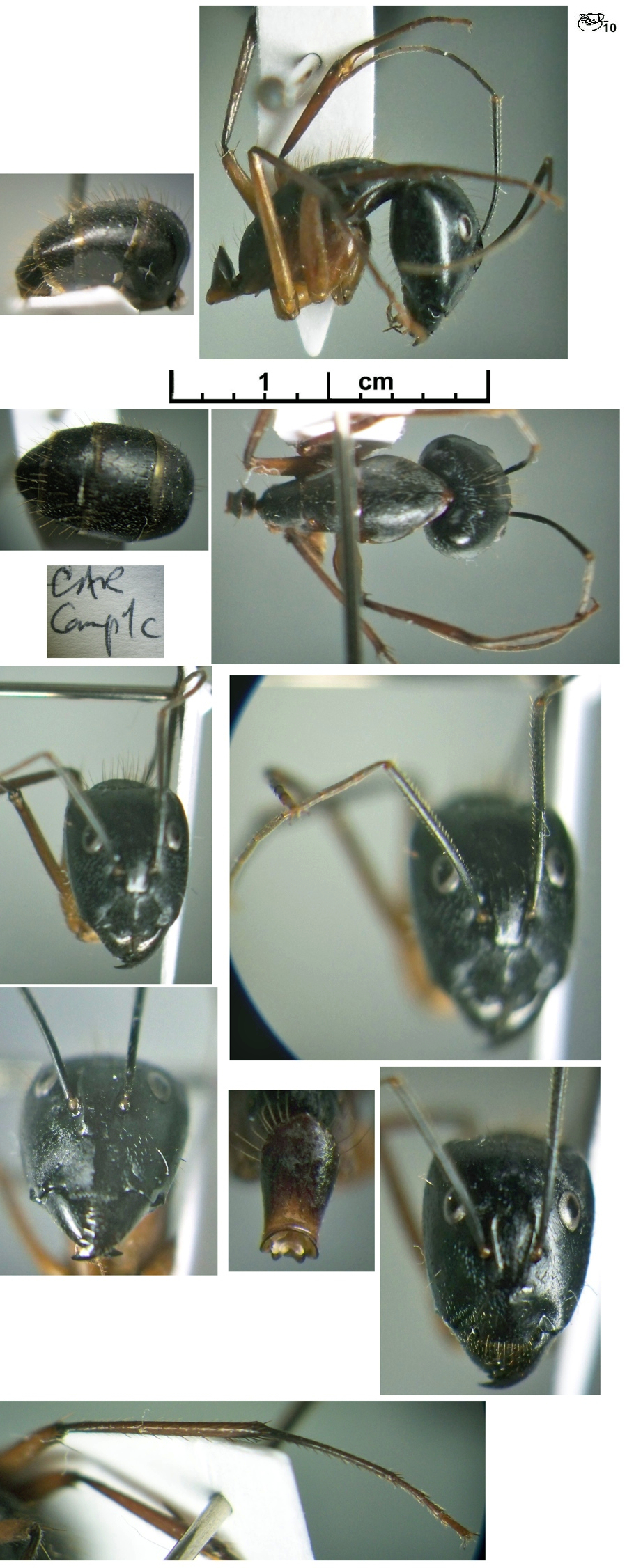 The photomontage
is of a probable second major from the same collection in Central
African Republic (CAR Camp 1C). The photomontage
is of a probable second major from the same collection in Central
African Republic (CAR Camp 1C).
|
 The photomontage
is of a probable minor from the same collection in Central
African Republic (CAR Camp 1C). The photomontage
is of a probable minor from the same collection in Central
African Republic (CAR Camp 1C).
|
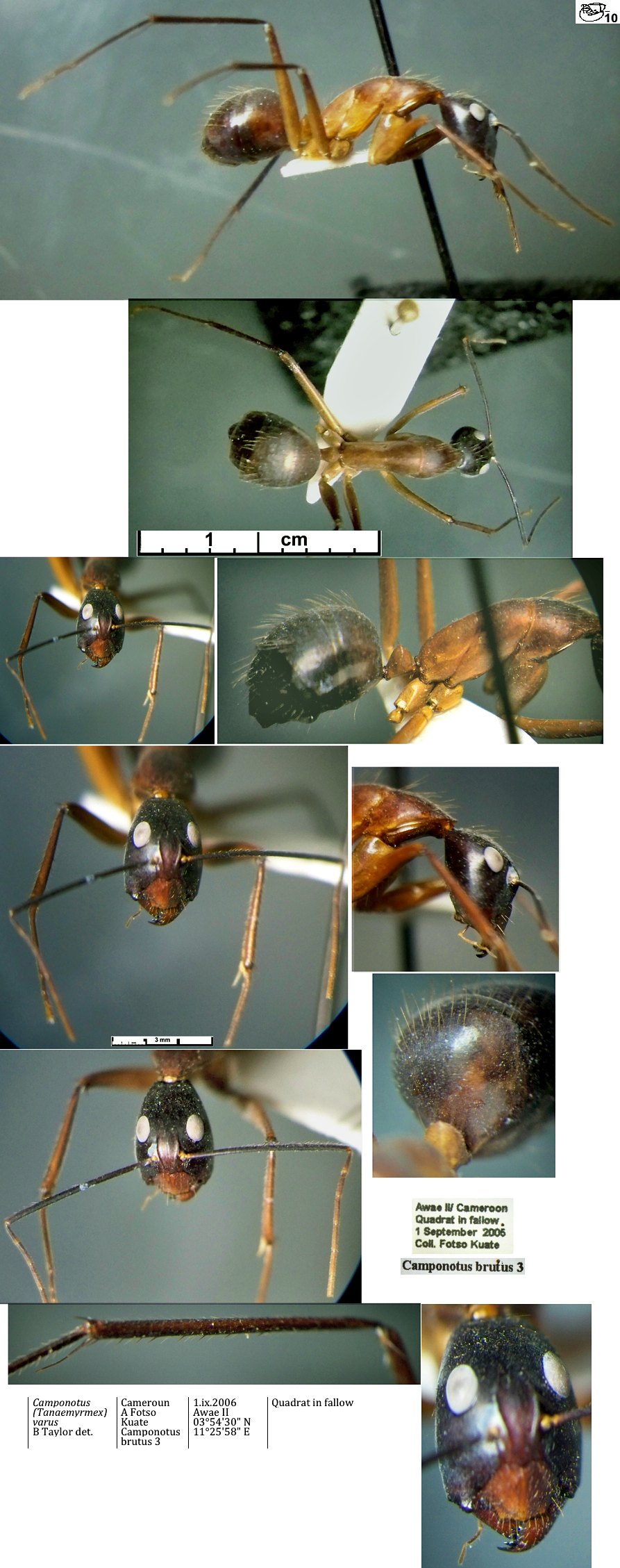 The
photomontage is of a minor worker from Cameroun, Awae II;
collected by A Fotso Kuate. The
photomontage is of a minor worker from Cameroun, Awae II;
collected by A Fotso Kuate.
|
 The
photomontage is of a minor worker from Liberia, Liabala;
collected by E poirier (Liabala PF IV). The
photomontage is of a minor worker from Liberia, Liabala;
collected by E poirier (Liabala PF IV).
|
 The
photomontage is of a possible queen from Liberia, Liabala;
collected by E Poirier (Yekepa Camp 4 PF III). The
photomontage is of a possible queen from Liberia, Liabala;
collected by E Poirier (Yekepa Camp 4 PF III).
|
 The
photomontage
is of a probable male from Central
African Republic, Dzanga-Sangha NP; collected by
Philippe Annoyer (CAR MJ). The
photomontage
is of a probable male from Central
African Republic, Dzanga-Sangha NP; collected by
Philippe Annoyer (CAR MJ).
|
|